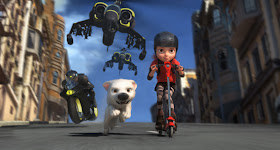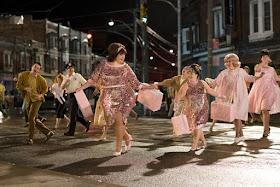Strother Martin Film Project
Thursday, December 31, 2020
MONSTER HUNTER
Wonder Woman 1984
So we finally get to see the movie that most fans of Comic Book movies have anticipated for the year. It was pushed back from it's original release, and then pushed back again to Christmas, and finally, it is released on streaming at the same time it shows up in theaters. It turns out that it is mostly a lump of coal rather than the diamond in the crown. WW84 will probably turn out to be the biggest critical disappointment of the year. After so may expectations created by the first stand alone Wonder Woman, this will feel like a huge letdown.
The failures of this movie are not in production values, performance or any technical field, they are mistakes in the storytelling. As I've said a dozen times or more over the years, I am not a comics guy. So I can't tell you how this story follows the path of the character in the comic books. I understand that this was a storyline in 1984, so that must account for the reason the film has been situated in the past, and that seems to be the only reason it is. That and the fact that 1984 will give the film makers a chance to lampoon the fashions of the era, basically playing off the same trick as "The Wedding Singer". Otherwise, there is no reason that the movie could not be set in a contemporary framework.
As usual, I avoid spoilers as much as possible, but the first thing I want to talk about is the opening of the film, and I myself see no real connection to the rest of the story, so it will not ruin anything in that regard. The opening is a flashback sequence to Diana as a young girl on Themyscira and basically it is a long sequence from an episode of "Wipeout" or "Ninja Warrior". At the conclusion, we get a few words from her mother Connie Nielsen and her Aunt Robin Wright, and then they are gone and the land of Diana's origin is never revisited during the movie. That is understandable given the story we had before and the Justice League follow up. However, if you watch the trailer, it suggests a cross cutting story between two past timelines and that makes this a disappointment. The bigger issue on the other hand is that the sequence introduces a plotline about the "truth", but it is forced onto the events in the sequence and there is not really a follow up in the main part of the film. It probably would have been better to stick with the idea that there are no shortcuts to real happiness or success. At least that would have fit in with the story that develops in the 1984 setting.
The main plot is attempting to do what other superhero films sometimes try and usually fail at accomplishing, creating two antagonists for the hero to deal with. Barbara Minerva is a potentially great character who would match up well with Diana Prince in both of their personas. Kristen Wiig plays Barbara as mousey and lacking the confidence of Diana Prince in spite of her clear accomplishments. When she develops the "Cheetah", she is a match for Wonder Woman but that process get interrupted by and pushed aside by the second villain. Pedro Pascal plays Max Lord, a TV investment guru who has designs on an ancient object that might grant him his wish to save his crumbling empire. His efforts are the thing that lead to the usual cataclysmic outcomes that these stories always seem to demand, even when they are not needed. We spend so much time following a chain of events in his plot that we lose the promising story of the two powerful women heading into a conflict. That relationship becomes a side issue to the third act end of the world scenario and CGI-fest that has undermined most of the DCEU films so far. Max Lord is basically Jafar from "Aladdin" at the end of the film.
In an attempt to avoid repeating themselves and having one of the ancient gods appear as the opponent [Ares in Wonder Woman, Steppenwolf in Justice League], we get an object that is the equivalent of a magic lamp. Then the mystical object is anthropomorphized as a human character. There is a repeated quality to the film that does not escape notice by screenwriting trickery. The fish out of water device that was used amusingly to introduce Diana to WWI era Great Britain, is repeated almost note for note with a fashion show for Steve Trevor (Chris Pine) when he appears in 1984. The mocking of men's clothing styles from that time period is fun, but it is merely a side note. Also, the sacrifice of one of the characters is a dead on repeat of the original story, it is not disguised at all.
There are a number of inconsistencies in the world the screen writing team and director have come up with. The way in which wishes are granted is arbitrary, suggesting at one point that a person can have only one, but then turning around and granting an additional wish to one of the antagonists without any explanation. The idea that "wishes" have unintended consequences ala the old monkey's paw style curse, is fine and may explain a trade off in powers that is part of the story, but later on it seems that the wish granter may take anything they so choose in exchange for the wish. The long standing joke about Wonder Woman flying in an invisible plane is another one of those confusing conundrums that are largely skimmed over. Also, the setting is 1984 and there is a sequence with the President of the U.S., but that person is never referred to by name and the actor playing the part bears very little resemblance to the 40th President. The answer that the President gives to a question about his deepest wish is the exact opposite of the widely known desire that Reagan had for no nuclear weapons. It was the underpinning of the Strategic Defense Initiative to render such weapons powerless.
I generally avoid reading or listening to other reviews before I provide my hot take on a film. I waited to edit the Lambcast on this subject until after I'd seen the movie and formed my own opinions. My friends on the Lamb were harder on the movie than I was, so maybe these criticisms are not as minimal as I thought. I just know that although I was glad to see the film (In a Theater!), I was let down by the script and direction. There are some fine action scenes but the heart of the movie should have been the relationship between Diana and Barbara, and that turns out to merely be the gall bladder of the film.
Wednesday, December 2, 2020
The Croods: A New Age
Monday, November 23, 2020
The Last Vermeer
I love history, it is where some of the most amazing stories get told and they are not fiction. While you always want to be careful about taking a feature film as authoritative on a subject, many of them do reflect events fairly accurately or at least convey the essence of that history. This is a story I'd not heard of, it is apparently largely true, and it worked twice as well for me because I have never encountered it before. This independent film was the only new film opening this last week and as soon as I saw who the star was, I was ready to commit.
Set immediately at the conclusion of the war in Europe in 1945, Captain Joseph Pillar of the Canadian military, who is a Dutch Jew, has returned home to locate art treasures plundered by the Nazi's during the occupation. After discovering a Vermeer, in Goring's personal collection, he attempts to track down how this piece of art ended up in the hands of Hitler's second in command. The story appears at first to be a mystery about collaborators in Amsterdam, who allowed these treasures to be taken in return for money and special treatment by the invaders. Pillar tracks this painting as a legitamate sale, through brokers and others in the Dutch art community. Here he encounters Han van Meegeren, an unsuccessful artist who somehow seems to have thrived during the war.
The interviews and cat and mouse games played out in the first third of the story suggest that the film is headed in a particular direction, but of course there is a turn that drives the rest of the story in a very different direction . Van Meergeren is played by Guy Pearce, an actor who has always been a favorite of mine. Han is a contradictory personality, he faces execution for collaboration with the enemy, but seems to be a charming, slightly eccentric social climber, who was popular in the party circuit, despite being perceived as a mediocre talent. Pearce plays him as aloof from the threat he faces and distracted as he tries to continue painting while incarcerated. Pillar and his partner are befuddled a bit by this attitude and they delve deeper into the events that lead them to Han in the first place.
As I said, there is a twist that alters the relationship between Han Van Meergeren and Captain Pillar. When the film focuses on that relationship, it usually works well. Unfortunately, we get a back story about Pillar and his wife during the war, and there is a potential Romance between him and his art curator assistant Mina. The Captain is played by Danish actor Claes Bang, and he is sullen, guilt ridden and not really very interesting. When the focus of his role changes, he doesn't seem to be very motivated. Maybe the first time director Dan Friedkin, didn't see that his leading man was coming off like a stiff. It is additionally problematic because Pearce is infusing his character with a sly energy that firs the way the story ultimately plays out.
There is a creepy side story about the Dutch government trying to punish the collaborators, and it is represented by two characters that add to some confusion at the end. There is an obstinate judge who seems uninterested in justice and more committed to the government's narrative than he should be. Then there is the police detective who claims jurisdiction over the case and motivates the trial in the last third of the story. He comes across like the Dutch version of the Gestapo, rather than a dedicated civil servant. There is one more twist and I can't say I quite understood what point was being made. I am also unclear as to how accurate it is to the real story.
As I said at the start, what makes this film worth seeing is not necessarily the drama but rather the history. Regardless of motivations, Han Van Meergeren seems to have been a brilliant artist, unappreciated for those talents but remembered for his cleverness. The film has accomplished at least one objective, I want to read the book this is based on and find out more about this less known aspect of WWII.
Saturday, November 14, 2020
Freaky
This is a movie that I enjoyed but wanted to like more than I did. The premise is the main selling point and it is a great one. This is a mashup of body switch comedies like "Freaky Friday" with a traditional slasher film like "Friday the 13th". Doesn't that sound fun for horror fans? Then as an added twist the victim body is of the opposite gender, but not a cheerleader, rather it is a girl who is underappreciated and struggling with self esteem issues and grief. There is a pattern here if you look closely at the film's pedigree.
The writer/director of this film is Christopher Landon, who previously brought us "Happy Deathday" both 1 and 2. I was not a big fan of the first movie and never saw the second. The one thing that made "Happy Deathday" unique was the redemption arc of the lead character. "Freaky" tries to replicate that formula by making this a story of empowerment in two contradictory ways. First, the nebish girl gets a makeover when her body is occupied by the serial killer. Now I know that this is a fantasy comedy and we have to suspend a lot of disbelief in the first place, but the conundrum here is one of the writers own making. By taking shortcuts in the storytelling to hook us in, he sacrifices opportunities for humor and internal logic. The killer, known as the Blissfield Butcher, has been written as a mindless hulking transient with severe hygiene issues and maybe a drug problem. So how does it make sense that he would have a stronger fashion eye and makeup skills than the teen girl whose body he is occupying? If the killer were more Hannibal Lector than Jason Voorhees, this could work. The writer just wants us to go with it. The teen girl Millie, does get a little more sensible transition, marveling in being able to urinate standing up and turning her nose up at the smell emminating from her new body. The second way the story plays up the female empowerment is by letting her revel in her newly aquired strength.
Serial killer in the girls body, ends up taking revenge on the girls tormentors, with just the slightest amount of reason to limit it to those figures. If the story let it play out more this would be ok, as it is, it feels a bit rushed and coincidental. Meanwhile, the parallel story of our hero trapped in the hulking body of the maniac does work itself out a little better with trying to connect with her friends at school to get some help. Finding yourself romantically and in your relationship with you mother is a little harder to believe. This is the personal growth story which is supposed to add some weight to the story. I think it clutters up the horror and only occasionally adds to the humor.
Vince Vaughn is the star of the film rightly so, because he has to personify a character. Unfortunately, Kathryn Newton doesn't get as much to do after the switch. She is believable in the pre switch section, but merely stares aggressively in the main part of the story, because the serial killer, while having a fashion sense, has no personality or character traits.
OK, enough with the thoughtful insights, the movie does have two or three pretty gruesome murders to keep us engaged as horror fans. The Opening section that sets up the supernatural twist, has some graphic violence but also a touch of humor. The cocked head of the killer after pinning a victim to the wall is right out of "Halloween" and was subsequently used in some of the Friday the 13th films. Two effective murders are basically spoiled by the trailer, but the buzzsaw sequence still shocks because of It’s graphic depiction.There is a coda section that is meant to drive the female empowerment theme home at the end. It makes sense only because we know that the killer always has an extra scene in the conclusions of these sorts of films. It would mean more if the killer had motivations or some background character, but all he has is the conventions of the genre.
So my reaction is similar to the feelings I had about the earlier film, but where that story made the redemption work a little, it simply feels shoehorned into this film. The movie has enough going for it to make a trip to a theater, but it will quickly fade as other better executed horror/comedy mashups come along.
Wednesday, November 4, 2020
Evil Dead with Bruce Campbell
Monday, October 19, 2020
Honest Thief
Monday, October 5, 2020
Lawrence of Arabia (Austin Edition)
As usual, when Lawrence of Arabia is playing on a Big Screen, I want to be there. This was my second visit to the Paramount Theater in Austin and we took a different approach this time. Choosing Orchestra seats, we watched the movie from an appropriate perspective and got to enjoy a different view of the theater.
Again, it is a beautiful classic movie palace and I expect as the year ends, I will be joining the organization that maintains it. Memberships have privileges, but I do want to see that the programming is going to continue, even with the Covid restrictions.
Having written about this film a number of times, it is challenging to find perspectives to focus on for each new post. However, in this weekend's screening, I had two things jump out at me immediately.
Editors deserve a huge amount of credit for the movies they work on. There are many films that have been saved by an editor fixing things that the director was unable to take care of on set or location. Anne V. Coates was certainly deserving of accolades when she did this film, but it is clearly the vision of David Lean. Coates however realized that vision in numerous ways.
I did not take notes on all of the cuts and transitions but I noticed especially in the first third of the picture how jump cuts were used judiciously. The most famous being the jump from Lawrence blowing out the match to the rising sun over the desert. The camera work was smooth but it is enhanced by a timely use of swipes from below and the sides. It was also impeccably timed to synch with the fil's action and music.
The other thing I was paying attention to during this screening was the willfulness of Lawrence himself. In the first half of the movie, the story revolves around the success that Lawrence wills himself to accomplish. The match trick is the perfect precursor to all of these points. As he tells his colleague who burns himself while trying to copy the action, "the trick is not minding that it hurts." He chooses to forgo a drink when his guide does not drink. He is unyielding in the first confrontation with Sherif Ali. The trip to Aqaba across the Nefud desert is a miracle that he chooses, and then he repeats it with the trip across the Sinai.
He jokes at one point with General Murray that he is not insubordinate, but rather it is his manner that makes him seem so. That is a piece of circular reasoning being used to justify the fact that he is willful, even with those under whom he is supposed to be working.
The events after the intermission, demonstrate that will alone cannot accomplish the things he wants. He uses the same fierce will power to lead the Arab Army, but with limited success in regard to their discipline. The military success cannot be matched with political success. His will is broken at one point by his brutal encounter with the Turks, and the depraved General played by Jose Ferrer. He blames Allenby for returning him to the effort, but it is Lawrence's will power that moves him to try to reach Damascus first.
These were just a couple of new notes on the continuing love I have for this film. You can read more Here, and here, and here, and here, and here, oh and here.
Friday, October 2, 2020
Saturday, September 26, 2020
Bill & Ted Face the Music
Wednesday, September 23, 2020
JAWS 2020 Visit
They were closed over the summer but recently re-opened and there is a series of popular classics scheduled for the next month or so, including this greatest adventure film of all time. The theater is an old style movie palace that has a mezzanine section and a balcony above the main orchestra level of the theater. We chose seats up here so we could get a better look at the walls, ceiling and boxes of the theater.


Tuesday, September 1, 2020
Tenet
This was probably the most anticipated film of the summer for a lot of people. Because of the Pandemic shutdowns, it got pushed back three times before finally making it to theaters this week. Bu all means, see this movie if you are interested, in a theater. The scope, photography and action sequences will be diminished if you choose to see this on a tablet, TV screen or heaven forbid, on a phone.
I want to start with a message that is also a warning. If, during the course of this Two and a half hour film, you need to visit the restroom or concession stand, and you are worried you will miss something that clarifies the story or advances the plot in the time you are gone, go ahead and go. Nothing explained in any five minute sequence during the film, will help you keep track of what the hell is going on in this movie. "Inception", "Memento" and "Interstellar" all play with time and parallel events. If you ever had trouble following those concepts, which are reasonably well explained although still confusing at times, get ready to feel completely lost. For the first hour, things made sense and you could follow the logic of the world Christopher Nolan has created here. The premise is interesting and it contains the usual conundrums that time travel stories face. The problem is that about a third of the way into the film, two or three additional plot elements are introduced, each one with different time influences , and they all start influencing each other. Sometimes those effects are so complicated that a map would not help you. Events start moving faster and trying to keep up will be a waste of time if you are also trying to enjoy the movie.
There is nothing inherently wrong in having a complicated plot, if at some point you can make sense of how it all comes together, "Tenet" attempts that but largely fails to be coherent, even though several of the twists involve tricks you have seen a hundred times before in a time travel story. Ultimately, I think you can view this film as one loop in an event that has a limitless number of possible variations. Doing that will not make the story more satisfying however. I would have to see the movie several more times to pick out the inconsistencies and conundrums that pop up, but to be honest, Nolan himself doesn't seem to care about them. He even has one of the characters say as much, fairly early in the film. Stop trying to make sense, let's just let this wash over us. I can live with that, but it will leave Tenet as an exercise in style and film making, rather than a piece of cinematic art.
With a pre-title sequence that feels a lot like a Bond film, Nolan sets this up as an espionage story, that potentially would be confusing the way some double and triple cross stories can be, but it would still be grounded. As the science fiction element takes center stage, the tradition spy tropes get doubled back on with a wink and a nod to time travel twists we have seen before. I won't spoil it for you, but during a heist scene, one character confronts another and we don't see the second characters face in that sequence. You know that will play out again, and there will be a reveal.,,guess what's coming.
John David Washington has just enough charisma to play the low key "Protagonist" of the story. The scene that shows off the potential of what might have been a solid spy film, involves his lunch with Michael Caine. It is not his fighting skill, or dramatic intensity that makes the scene work, rather, it is his bemused self confidence in the face of being judged by others. One place I don't think he was quite successful at was the near romantic element of his relationship with the character played by actress Elizabeth Debicki. I can buy that he feels a sense of responsibility for her in a paternalistic way, but the embers of romance that are supposed to be the base of this are not there. He can sell that he cares, what is not clear is why he cares.
We get a pretty good preview of what the next Batman movie will be like because Robert Pattinson, plays a much more active Felix Leiter to Washington's 007. I suspect, that as in most of the good Batman films, the quirky Bruce Wayne will not take a back seat to the brooding "Dark Knight". Pattinson plays Neil, the mysterious counterpart to the Protagonist, and he has a light touch with the humor and enough presenter to sell the physicality.
You ready for a surprise? The actor who steals the movie is Kenneth Branagh. Taking the start he made on a similar character in the Jack Ryan film from a few years ago, Branagh manages to make a cartoon villain feel dangerously real. A kingpin of a Russian oligarch, it would be easy to just say the lines and have threats come off as empty bravado. Nolan gives Branagh actions to play that show us his ruthlessness, the actor adds a sense of menace to those lines, but never with the charm of a fictional character. Instead, the deadly earnestness of his performance is disturbingly real. The tiniest touch of humanity right at the end of the film paints just enough of a persona to make the character evn more real, and loathsome.
Filmed in some of the most beautiful locales in the world, it would be hard to fault the look of the picture. The movie is not overcut in the action scenes, but the parallel time tracks and reverse structure do require some frequent cuts in perspective that can get a bit confusing at times. The backward car chase sequence looks great, but when it is followed up on, instead of being clearer, it leads us to start questioning what we really saw before, but not in the good way that it is supposed to work.
At two and a half hours, despite a solid pace, the film feels long. Probably because of the plot conceit concerning inverted time elements. I loved "Memento" but it was less than two hours and the same kind of thing happens there. Adding another forty minutes to it would do to it what happens with "Tenet", it makes you look at your watch and wonder how much longer it is going to go on. Maybe when it is serialized as a four hour mini-series, it will work better.
 Christopher Nolan has one of the greatest imaginations in the film industry. There are terrific concepts in most of the movies he has made. There are simply too many times that we ravel on a tangent that takes up a chunk of time but might have been replaced with something simpler as just as easy to admire. The stacking Russian Doll story structure worked well in "Dunkirk", it was clever in "Inception", but it is simply overdoing it in this movie.
Christopher Nolan has one of the greatest imaginations in the film industry. There are terrific concepts in most of the movies he has made. There are simply too many times that we ravel on a tangent that takes up a chunk of time but might have been replaced with something simpler as just as easy to admire. The stacking Russian Doll story structure worked well in "Dunkirk", it was clever in "Inception", but it is simply overdoing it in this movie.I probably sound like I am down on the film, I'm not really. I enjoyed it quite a bit. Pattinson and Washington invading a penthouse in India, or doing a heist at an airport freeport, were well staged action scenes. The inverted battle at the climax of the movie was spectacular to look at but mostly incomprehensible. The inverted stories are fine but when you start to retcon your own movie to change the outcomes, you create dilemmas that Solomon could not work out and algorithms that might give Einstein fits. See the movie, go with what is happening on the screen at any point and don't try to make it make sense. That extra brainwork will distract from the moment, and it is the moments that make this movie worth seeing, not the plot.
Sunday, August 30, 2020
The Personal History of David Copperfield
We have had plenty of Jane Austin inspired films in the last few years, including a charming version of "Emma" earlier this year. It's time for a change up, but not too big a change, so we will stick to 19th century English writes, but change genders, decades and primary locations. Who is in the mood for some Charles Dickens?
I'd not seen the trailer for this film before we went to the movies, in fact, I don't even think I'd heard of it, but it was the weekend, theaters are opening up, and this was not "The New Mutants" so it became the designated choice for Saturday afternoon. From the start, you can tell this will be an interesting approach to telling the well worn story of David Copperfield. The opening of the film is set up like it was a lecture hall, and the audience was certainly more diverse than you would have seen in 1840's London. That is one of the winning choices of the film makers. Casting was dictated not by historical accuracy or by Dickens's description per se, but by the ability of actors to be charming in the roles that they are cast in. Our hero is portrayed as an adult by Dev Patel, not a traditional Englishmen of the stage. He is delightful in the role, and I have been a fan since "Slumdog Millionaire". He has an earnestness that matches well with the Dickensian moods of our hero. I assume that the young Ranveer Jaiswal was chosen to play the young David Copperfield because he matched up with Patel in many ways, but the way that is most important is demeanor rather than appearance and that worked here.
Director/writer Armando Iannucci is familiar to me because of two films, "In the Loop" which was a MOTM on the LAMB three years ago, and "The Death of Stalin" which was widely hailed and recommended to me. Both films were solid comedies with a bent to them that is very distinctive, and that sensibility is also found in this movie, at least in a few spots. I had some reservations because the framing device and transition to the traditional narration felt a bit frantic and unclear at the beginning. It was as if the director was struggling to signal that this is a comedy, while still trying to retain the elements of Copperfield that are not really funny. The whole thing settles down after about ten minutes and the more straightforward narrative takes over. There are still plenty of the odd moments and stylings that Iannucci is well known for, but it fills the story rather than driving it as we go along.
I recognized Peter Capaldi, not from Dr. Who, which I don't watch, but from "In the Loop" and the "Paddington" films. I thought he was a perfect Mr. Micawber, and every time he showed up the movie was funny again. Hugh Laurie, who plays Mr. Dick, was also a comforting comical presence. Both of these actors are capable of playing off absurd circumstances yet still pulling some poignant moments amid the craziness. My guess is that most of the cast will be far more recognizable to Brits than we colonists, because they all seem very good, so they probably work in television programming or theater that is more U.K. centered.
 The casting of romantic counterparts in the film might be a little precocious since the point seemed to be to emphasize the lack of ethnocentricity, The actors are so good however, that what might have been seen as an affectation, turns out to be barely noticeable. Rosalind Eleazar as Agnes, a love interest for Patel, and the daughter of Benedict Wong's Mr. Wickfield, crossed two ethic boundaries at once and we don't care at all. This is the sort of casting I think would address the desire for diversity without drawing attention to the fact that you are trying to do that.
The casting of romantic counterparts in the film might be a little precocious since the point seemed to be to emphasize the lack of ethnocentricity, The actors are so good however, that what might have been seen as an affectation, turns out to be barely noticeable. Rosalind Eleazar as Agnes, a love interest for Patel, and the daughter of Benedict Wong's Mr. Wickfield, crossed two ethic boundaries at once and we don't care at all. This is the sort of casting I think would address the desire for diversity without drawing attention to the fact that you are trying to do that.For a complicated story, the film is paced pretty well. I do think that the opening section with the awful Mr. Murdstone needed to fleshed out a bit more, but perhaps the youthful Copperfield isn't where the writer found the most joy in the story. If you are able to see the film, by all means do so. I think it would be easy to peg the costumes for awards consideration at the end of the year. The clothes help make the characters easy to understand and entertaining simultaneously. Copperfield has some tragic moments but this production does not dwell on them, it acknowledges those points but move quickly to it's objective, which is to amuse us. The return of the bookend devices toward the end of the film are much less jarring than at the start of the story and they finish things off nicely.
Sunday, August 23, 2020
Unhinged
Russel Crowe is the great white shark in this movie. I mean that figuratively for the most part, although his physical presence in film in the last decade have in fact suggested that Quint was right in assessing the weight of the opposition. Crowe plays a character listed in the credits as "The Man", an interesting coincidence sine the last film posted on this site "The Naked Prey" also features the same credit for the lead actor. Ay one point the character introduces himself as Tom Cooper, so I'm going to refer to him by that name for the rest of this entry. Cooper is a disturbed man, who we know immediately is going to be trouble. There is a pre-title sequence that establishes with violence from a distance, that Tom has lost all sense of proportion or reasonableness. This may work against the story a bit in the long run because we are never going to listen to the perspective he articulates and the background set up in the title sequences will become irrelevant. Tom is a bad man who can feign politeness for a few moments but ultimately will reveal himself as a lost monster.
Actress Caren Pistorius has to carry most of the film herself by reacting to phone calls and traffic encounters. There are a few moments of human interaction but they pass by pretty quickly. This movie is likely to do for road rage acts of expression, what "Fatal Attraction" did for extra-marital affairs, scare the potential bird flipper away from such emotional outbursts. Although there is a self righteous payoff line at the climax of the film, the real coda happens a few minutes later when Caren is reminded of how this whole day turned into a nightmare for her in the first place. I don't think we should all assume that the worst possible thing that could happen will be the most likely thing to happen, but a little perspective is not a bad thing. Unfortunately, because we know from the start how awful the antagonist is, that perspective will not get a hearing.
Trying to turn a road rage incident into a movie is possible. Spielberg did it fifty years ago with "Duel". This script however goes in some very different directions based on the level of privacy we give up by using smart phones. I can't say what technological innovations will make those plot devices irrelevant in twenty years, but there will certainly be something. Like people today who laugh at classic films that use the absence of a phone in a remote location as a plot device, someday, the content of phones will seem like an antiquated tool for storytelling. The movie suffers from a few of the traditional plot holes that these sorts of movies suffer from. The main protagonist makes some dumb choices, the villain has prescient sight, and abilities that are far deeper and quicker than the average person can manage. The cops, who in real life have helicopters chasing drivers who run after a bad traffic light call, can't seem to get it together enough to track, pursue and capture a man that has committed multiple atrocities and continues to do so. This is movie story telling, not the real world.
Let's put all that aside for a moment. Crowe plays the maniac with enough range to make the character somewhat compelling. The vehicle jump scares and action beats are always effective, and the resolution meets our need for retribution and recovery. It's not a great movie, but it came at a great time for me. I can't stay locked down forever, and escapist fare like this helps quite a bit. And as this poster tells you. I saw it in a theater.
Thursday, July 16, 2020
The Naked Prey (Movies I Want Everyone to See)
Since the invention of film there have been a number of stories that feature man against nature. Those stories have often cast a group of men against a an overwhelming natural force; Hurricanes, fires, floods, the cold of the poles, the heat of the desert and the savagery of animals trying to eat and live. My own experience with such films include "Jeremiah Johnson", "The White Dawn", and "Man in the Wilderness". In the American film experience, a number of these stories featured explorers or pioneers in the West, seeking to survive a trip through Indian lands, to build a new life for themselves or to profit from the natural resources they find on their journey. As part of the narrative there is often contact with other cultures and that contact takes a violent turn. Regardless of whether you sympathize with native peoples whose way of life is threatened or the intruder who sometimes acts foolishly and at other time heroically, these stories can be compelling and exciting. Westerns are littered with ill fated travelers being killed in brutal ways by Indian tribes they encounter (And of course the inverse is true as well, the intruders are not healthy for the native population either).
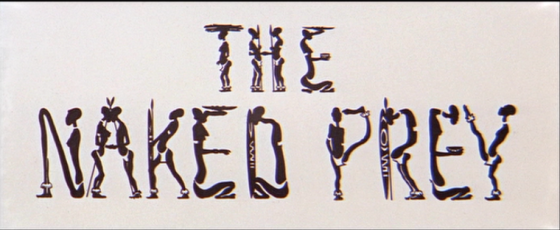
"The Naked Prey" takes a North American historical incident of this type and transplants it to a similar environment in Africa. An ivory hunting safari is waylaid as it engages in the slaughter of elephants. The hunters have managed to antagonize an indigenous tribe by failing to provide a tribute asked of them. The wisdom of the hunt manager was ignored and the bull headed financier of the expedition dismisses the tribesmen as beggars and thieves. The Western legend has John Colter, once a member of the Lewis and Clark expedition, captured by a Blackfoot tribe, being turned loose by his captors and hunted like an animal. He survived his nearly two week trek through the wilderness, naked and having had to kill several of his pursuers. The lead character in this film, billed as "Man" is the safari manager and has the Colter part.
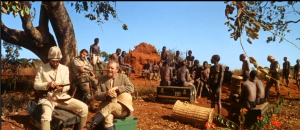 This film takes the story to a credible location and adds some fascinating dimensions to the
original legend. Cornel Wilde, was an actor who had been nominated for
an Academy Award playing Chopin in 1946. The following years are mostly
filled with low level parts in bigger pictures or starring roles in
second level swashbucklers. He created his own production company and
created several films before this piece of rousing adventure
entertainment. Here he is the star, producer and the director and he
does most of this while nearly naked on the set for the whole shoot. He
was fifty two at the time and looked in good shape despite reportedly
being sick with some local bug at the time.
This film takes the story to a credible location and adds some fascinating dimensions to the
original legend. Cornel Wilde, was an actor who had been nominated for
an Academy Award playing Chopin in 1946. The following years are mostly
filled with low level parts in bigger pictures or starring roles in
second level swashbucklers. He created his own production company and
created several films before this piece of rousing adventure
entertainment. Here he is the star, producer and the director and he
does most of this while nearly naked on the set for the whole shoot. He
was fifty two at the time and looked in good shape despite reportedly
being sick with some local bug at the time.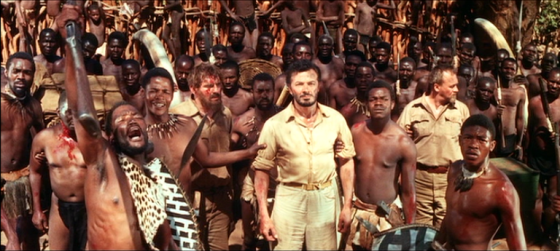
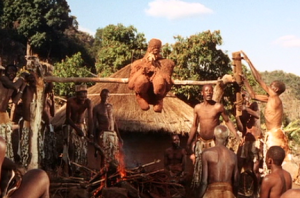
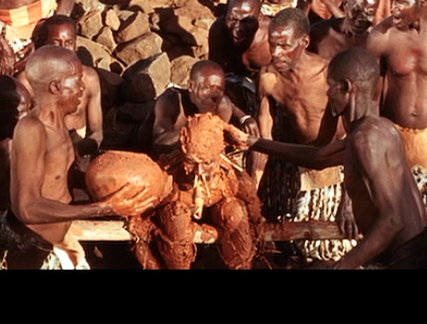 The
picture is pretty brutal for it's time. There is quite a bit of blood
involved, and the animal population of Africa appears to be threatened
with near extinction given the frequency with
which animals die in the course of the story. The images are not
politically correct because the deaths of the safari members at the
hands of the native tribe are gruesome and would do little to endear the
people of that tribe to the rest of the world. I first saw this movie
in the early 1970s and had nightmares over the grim method of execution
chosen for one of the hunters in the safari. He is basically trundled up
and encased in clay for the purpose of roasting alive over a fire. The
thought of the torture is disturbing enough but it was visualized
in a very realistic way and that made it all the more troubling.
Wilde's character is forced to watch the deaths of his compatriots and
then is lead out to a spot where one of the tribesmen shoots an arrow
down field and "Man" is given a head start to the spot where the arrow
has landed. This is where the chase begins.
The
picture is pretty brutal for it's time. There is quite a bit of blood
involved, and the animal population of Africa appears to be threatened
with near extinction given the frequency with
which animals die in the course of the story. The images are not
politically correct because the deaths of the safari members at the
hands of the native tribe are gruesome and would do little to endear the
people of that tribe to the rest of the world. I first saw this movie
in the early 1970s and had nightmares over the grim method of execution
chosen for one of the hunters in the safari. He is basically trundled up
and encased in clay for the purpose of roasting alive over a fire. The
thought of the torture is disturbing enough but it was visualized
in a very realistic way and that made it all the more troubling.
Wilde's character is forced to watch the deaths of his compatriots and
then is lead out to a spot where one of the tribesmen shoots an arrow
down field and "Man" is given a head start to the spot where the arrow
has landed. This is where the chase begins.We know very little about the character. This was supposed to be his last expedition before he retires to his farm, he is apparently married as there is a moment when his wedding ring is eyed by the hunters as a potential prize, and his name may be Larry, since he was called that a couple of times by another member of the expedition. Most of what we learn about this character is shown through his wits and behaviors both before capture and as he is trying to escape. He has a keen ear and realizes something is wrong before their party is attacked. He was the one who rationally advised paying a small tribute to avoid insulting the natives. He also seems to despise the acts of his partners in killing elephants that are unadorned with ivory tusks. He could easily be one of those experienced trackers from a Western, who know some of the native lingo and cultures and often tries to guide self centered troops or pioneers through dangerous lands. Clearly an archetype, he makes it easy for us to sympathize with him in his run for survival.
The native hunters are certainly cruel by modern standards but they are also human. This is a pretty amazing film in that it manages to create character and story without being dependent on dialogue. After the first ten minutes, the only dialogue we get is spoken in a unique African dialect that is not sub-titled. We know what is going on by watching the faces and hearing the noises the characters make. The ten men that end up hunting "Man", have emotional reactions to the death of their friends, they share moments of laughter and satisfaction, and they turn on one another as the chase becomes more and more deadly. All of this is accomplished without the audience having words to hang onto. It's not the same as a silent film in which the actors might have to exaggerate to convey an emotion or idea, the story telling is more universal and that makes it easy for us to relate to, even when we can't say exactly what the characters are saying.
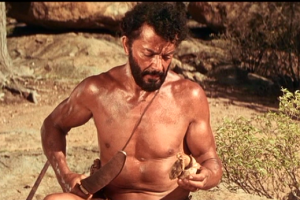 The story becomes a version of "The Most
Dangerous Game" and a nature film. Our hero manages to turn the tables
on his pursuers so he ultimately does have some weapons and a loincloth.
Still, he is alone in the wilderness and must manage to navigate
treacherous terrain, dangerous wildlife and multiple human threats as
well. Like most of these wilderness films, the character tries a variety
of animals, insects and plants to survive on. He
ends up having escargot made from giant crawling mollusks, and lizard
and rat. The one antelope he manages to take down he loses to a predator
higher on the food chain in this environment. There are a couple of
humorous scenes that show him struggling to get some food so while the
circumstances are dire, there is still a bit of humanity to entertain
us.
The story becomes a version of "The Most
Dangerous Game" and a nature film. Our hero manages to turn the tables
on his pursuers so he ultimately does have some weapons and a loincloth.
Still, he is alone in the wilderness and must manage to navigate
treacherous terrain, dangerous wildlife and multiple human threats as
well. Like most of these wilderness films, the character tries a variety
of animals, insects and plants to survive on. He
ends up having escargot made from giant crawling mollusks, and lizard
and rat. The one antelope he manages to take down he loses to a predator
higher on the food chain in this environment. There are a couple of
humorous scenes that show him struggling to get some food so while the
circumstances are dire, there is still a bit of humanity to entertain
us.The photography in this movie is sometimes spectacular. There are nicely composed shots of the chase through some interesting vistas and jungles. As night falls at one point there is a beautiful shot of the twilight sky, dark orange silhouetting the canopy of trees and hills in the foreground. There are also as many shots of animals as there are of anything else. A baboon turns the tables on a cheetah, just as our hero does the same on his pursuers. Birds are both beautiful and gruesome as they hover near the scenes ready to swoop in and feed on the entrails of other animals. There are several shots of snakes which might give you the creeps if snakes are your own fear. One noticeable mistake is giving a rattlesnake sound effect at one point to snakes that would not have that characteristic in Africa. If we were not immersed in the suspense of the story, it would be a pleasure to take in all of the sights as the film rolls through some great looking locations.
In the last quarter of the film, a long sequence involves "Man" showing that he really is someone to root for. He encounters another tribe that suddenly comes under attack from slavers. The harrowing episodes illustrate that the slave trade was one of the cruelest behaviors that human beings ever imposed on one another. Our hero helps a small girl escape from the scene by creating a dangerous diversion. Later she gets a chance to repay him and we have a brief respite from the grueling adventure and an opportunity to see humanity in a place where we might have despaired of it in the last hour.
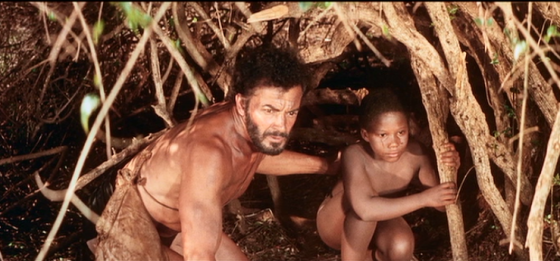 Throughout
the film the hunters and the prey spar over space and distance. This is
one of those films where the hunter wisely chooses when to run and when
to fight. The fight scenes that do happen are usually believable in the
context of the chase. "Man" gets the drop on his pursuers several times
and makes the most of those opportunities. A dramatic use of fire
allows him to put some space between himself and the chasers but also
gives him a chance to taunt them the way that they have taunted him from
the beginning. The struggles of the men chasing him set them back as
much as his efforts do. The men are skillful trackers but they are not
always as clever as the hero needs to be. A dramatic rift appears and it
is clear that the hierarchy of the tribe is created by power and
violence. Despite the murderous actions of the prey and the hunters,
both sides develop a respect for their opposite. That respect may have
existed to begin with since "Man" was given a chance in his torturous
form of execution, but it is multiplied by the tenacity of his fight and
the body count he builds in trying to return to a safe place.
Throughout
the film the hunters and the prey spar over space and distance. This is
one of those films where the hunter wisely chooses when to run and when
to fight. The fight scenes that do happen are usually believable in the
context of the chase. "Man" gets the drop on his pursuers several times
and makes the most of those opportunities. A dramatic use of fire
allows him to put some space between himself and the chasers but also
gives him a chance to taunt them the way that they have taunted him from
the beginning. The struggles of the men chasing him set them back as
much as his efforts do. The men are skillful trackers but they are not
always as clever as the hero needs to be. A dramatic rift appears and it
is clear that the hierarchy of the tribe is created by power and
violence. Despite the murderous actions of the prey and the hunters,
both sides develop a respect for their opposite. That respect may have
existed to begin with since "Man" was given a chance in his torturous
form of execution, but it is multiplied by the tenacity of his fight and
the body count he builds in trying to return to a safe place.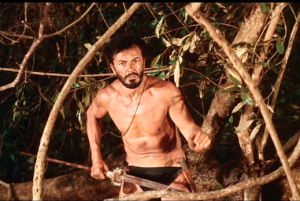 I
suspect that every viewer would imagine themselves in these
circumstances and wonder if they themselves are up to the challenge. As a
kid, loving adventure and the romance of an exotic place, we might hope
to think we would be equal to the trek. An adult might wince with pain
at the brambles and thorns that "Man" sometimes has to dodge and almost
assuredly we would be grateful for the civilization that we enjoy rather
than the brutality of the past we have managed to overcome. There are
still places in the world where human beings treat one another in the
most unimaginably brutal ways. A story like this gives us hope that we
can overcome those hardships and strive to avoid ever being in such a
situation ourselves. This is a tour de force performance from Cornel
Wilde. He manages, without words for most of the film, to evoke strength
and determination and ultimately humanity into a hellish world. As it
was clearly his passion project he should get the lion's share of the
credit. It is interesting to me that the film received an Academy Award
nomination for the script, which was certainly deserving, but that Wilde
was ignored both as director and actor. This is the movie that I
suspect he will best be remembered for. With a nod to the earlier
African adventure "Zulu", let me end this post with a salute to a
valiant warrior, the late Cornel Wilde.
I
suspect that every viewer would imagine themselves in these
circumstances and wonder if they themselves are up to the challenge. As a
kid, loving adventure and the romance of an exotic place, we might hope
to think we would be equal to the trek. An adult might wince with pain
at the brambles and thorns that "Man" sometimes has to dodge and almost
assuredly we would be grateful for the civilization that we enjoy rather
than the brutality of the past we have managed to overcome. There are
still places in the world where human beings treat one another in the
most unimaginably brutal ways. A story like this gives us hope that we
can overcome those hardships and strive to avoid ever being in such a
situation ourselves. This is a tour de force performance from Cornel
Wilde. He manages, without words for most of the film, to evoke strength
and determination and ultimately humanity into a hellish world. As it
was clearly his passion project he should get the lion's share of the
credit. It is interesting to me that the film received an Academy Award
nomination for the script, which was certainly deserving, but that Wilde
was ignored both as director and actor. This is the movie that I
suspect he will best be remembered for. With a nod to the earlier
African adventure "Zulu", let me end this post with a salute to a
valiant warrior, the late Cornel Wilde.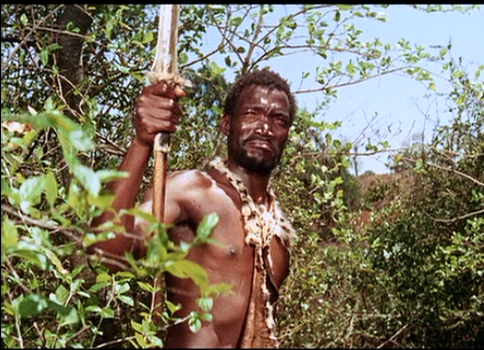
Richard Kirkham is a lifelong movie enthusiast from Southern California. While embracing all genres of film making, he is especially moved to write about and share his memories of movies from his formative years, the glorious 1970s. His personal blog, featuring current film reviews as well as his Summers of the 1970s movie project, can be found at Kirkham A Movie A Day.
Monday, July 6, 2020
10 Summer Suggestions 2020
Two years ago, I had the thought of looking at my collection of films and picking out some movies that would be perfect for a Summer evenings entertainment. With the current pandemic, most people have been streaming until their eyes are red, trying to fill the time that would normally be taken up by baseball games, family picnics, and a trip to the local movie house. People I have spoken too are binge watching gruesome murder mysteries, depressing true life documentaries and new films made for the streaming services (oh yeah, and Hamilton). Hey, I stream with the best of them, but I also still rely on my physical media to get inspired. So with an aim to keep the mood light, the family engaged and to dig a little into the past, here is an updated list for your Covid Summer Family viewing pleasure.
Tim Allen Comedies
Joe Somebody
 Allen plays a mid-level managerial type, who is not really appreciated at his job. He crosses paths with another employee, known to be a bully, who is physically bigger and more assertive than the mild mannered character Allen plays. What ensues is the equivalent to a schoolyard challenge to fight in the parking lot of their mutual employer on a given date. There is of course a moral to the story, but there are also some pretty good laughs along the way.
Allen plays a mid-level managerial type, who is not really appreciated at his job. He crosses paths with another employee, known to be a bully, who is physically bigger and more assertive than the mild mannered character Allen plays. What ensues is the equivalent to a schoolyard challenge to fight in the parking lot of their mutual employer on a given date. There is of course a moral to the story, but there are also some pretty good laughs along the way.

































